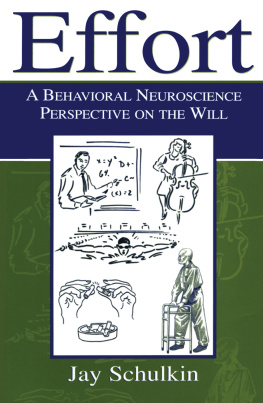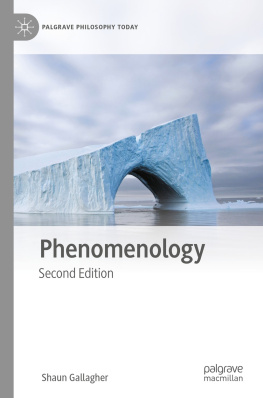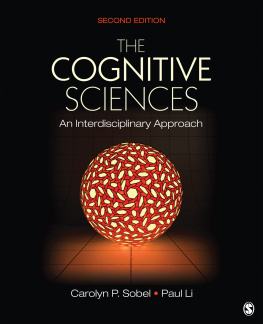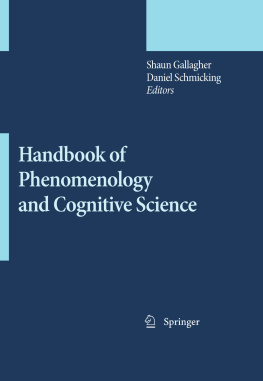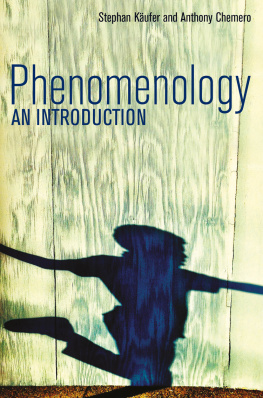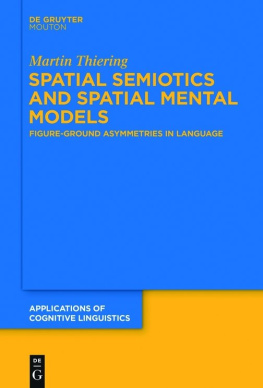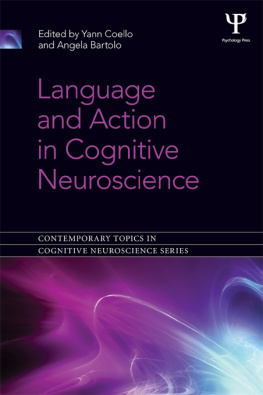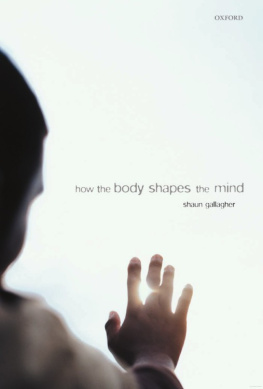Shaun Gallagher (editor) - Models of the Self
Here you can read online Shaun Gallagher (editor) - Models of the Self full text of the book (entire story) in english for free. Download pdf and epub, get meaning, cover and reviews about this ebook. year: 2000, publisher: Imprint Academic, genre: Religion. Description of the work, (preface) as well as reviews are available. Best literature library LitArk.com created for fans of good reading and offers a wide selection of genres:
Romance novel
Science fiction
Adventure
Detective
Science
History
Home and family
Prose
Art
Politics
Computer
Non-fiction
Religion
Business
Children
Humor
Choose a favorite category and find really read worthwhile books. Enjoy immersion in the world of imagination, feel the emotions of the characters or learn something new for yourself, make an fascinating discovery.

- Book:Models of the Self
- Author:
- Publisher:Imprint Academic
- Genre:
- Year:2000
- Rating:4 / 5
- Favourites:Add to favourites
- Your mark:
- 80
- 1
- 2
- 3
- 4
- 5
Models of the Self: summary, description and annotation
We offer to read an annotation, description, summary or preface (depends on what the author of the book "Models of the Self" wrote himself). If you haven't found the necessary information about the book — write in the comments, we will try to find it.
A comprehensive reader on the problem of the self as seen from the perspectives of philosophy, development psychology, robotics, cognitive neuroscience, psychopathology, semiotics, phenomenology and contemplative studies, all focused on a keynote paper.
Models of the Self — read online for free the complete book (whole text) full work
Below is the text of the book, divided by pages. System saving the place of the last page read, allows you to conveniently read the book "Models of the Self" online for free, without having to search again every time where you left off. Put a bookmark, and you can go to the page where you finished reading at any time.
Font size:
Interval:
Bookmark:
Title page
MODELS OF THE SELF
edited by
Shaun Gallagher
and
Jonathan Shear
Publisher information
2013 digital edition by Andrews UK Limited
www.andrewsuk.com
Originally published in the UK by Imprint Academic
PO Box 200, Exeter EX5 5YX, UK
Originally published in the USA by Imprint Academic
Philosophy Documentation Center
PO Box 7147, Charlottesville, VA 22906-7147, USA
World Copyright Imprint Academic, 1999
No part of any contribution may be reproduced in any form without permission, except for the quotation of brief passages in criticism and discussion.
reprinted 2001, 2002
Cover illustration: Claire Harper
Contributors
Jos Luis Bermdez
Philosophy, University of Stirling, Stirling FK9 4LA, Scotland
James Blachowicz
Philosophy, Loyola University, 6525 North Sheridan Road, Chicago IL 60626, USA
Andrew Brook
Cognitive Science, Carleton University, Ottawa, Ontario K1S 5B6, Canada
George Butterworth
Psychology, University of Sussex, Brighton BN1 9QU, UK
Jonathan Cole
Clinical Neurophysiology, Poole Hospital, Poole BH15 2JB, UK
Arthur J. Deikman
Psychiatry, UCSF, 401 Parnassus Avenue, San Francisco CA 94143, USA
Mait Edey
PO Box 2681, Vineyard Haven, MA 02568, USA.
Robert K.C. Forman
Religion, Hunter College, CUNY, 695 Park Avenue, New York NY 10021, USA
Shaun Gallagher
Philosophy and Cognitive Science, Canisius College, Buffalo NY 14208, USA
Tamar Szab Gendler
Philosophy, Syracuse University, Syracuse NY 13244-1170, USA
Jeremy Hayward
Shambhala Training Institute, Halifax, Nova Scotia, Canada
William Hirstein
Philosophy, William Patterson University, Wayne, NJ 07470, USA
Stephen W. Laycock
Philosophy, University of Toledo, Toledo OH 43606, USA
Maria Legerstee
Psychology, York University, Toronto, Canada
Anthony J. Marcel
MRC, Cognition and Brain Sciences Unit, 15 Chaucer Road, Cambridge CB2 2EF, UK
Mary Midgley
1a Collingwood Terrace, Newcastle-upon-Tyne NE2 2JP, UK
Eric T. Olson
Churchill College, Cambridge CB3 0DS, UK
Jaak Panksepp
Psychology, Bowling Green State University, Bowling Green, OH 43403, USA
Josef Parnas
University Dept. of Psychiatry, Hvidovre Hospital, Copenhagen, Denmark
Donald Perlis
Computer Science, University of Maryland, College Park MD 20742, USA
John Pickering
Psychology, Warwick University, Coventry, CV4 7AL, UK
Jennifer Radden
Philosophy, University of Massachusetts, Boston MA 02125, USA.
V.S. Ramachandran
Brain & Perception Laboratory, 1019, UCSD, La Jolla CA 92093, USA
Louis A. Sass
Clinical Psychology, GSAPP, Rutgers University, Piscataway, NJ 08854-8085, USA
Jonathan Shear
Philosophy, Virginia Commonwealth University, Richmond, VA 23284-2025, USA
Maxine Sheets-Johnstone
Philosophy, University of Oregon, Eugene, OR 97403, USA
Galen Strawson
Jesus College, Oxford OX1 3DW, UK
Jun Tani
Sony Computer Science Laborator, 3-14-13 Higashi-gotanda, Tokyo, 141 Japan
Kathleen Wilkes
St. Hildas College, Oxford OX4 1DY, UK
Dan Zahavi
Philosophy, University of Copenhagen, Denmark
Shaun Gallagher and Jonathan Shear, Editors Introduction
There is a long history of theoretical inquiry about human nature and the nature of the self. It stretches from the ancient tradition of Socratic self-knowledge in the context of ethical life to contemporary discussions of brain function in cognitive science. It includes a variety of theories developed in either first-person (from the point of view of the experiencing subject) or third-person (from the point of view of an external observer) approaches. On one reading of this history, the Western notion of the self continually narrows. The history of this issue begins with a conflict among the ancients. On one view, which comes to be represented most clearly by Aristotle, the issue is settled in terms of a composite and very complex human nature. Who I am is closely tied to my embodied existence and yet transcends it. The soul or psyche , as the form of the body, involves a multitude of life functions, including nutrition, reproduction, locomotion and sensation, but also action and philosophical contemplation. The rational (and for Aristotle this means social and linguistic) part of the soul lifts all of these functions to a higher, human and close to divine level. The other view, found as early as the Pythagoreans, clearly expressed in the texts of Plato, and later developed in Neoplatonic authors such as Augustine, held that genuine humanness is not the result of an integration of lower functions, but a purification of those functions in favour of a liberating spirituality. The animal elements are excluded from the human essence.
Along this same Platonic line, Augustine prefigures Descartes. For Descartes, and many modern thinkers, however, medieval spirituality was reducible to an important but narrow conception of rationality. The self is nothing other than the cogito, that is, ones own conscious mental events, a res cogitans , which is a mind composed of a unique, non-physical substance. At the beginning of the modern era, Descartes was led to the conclusion that self-knowledge provided the single Archimedean point for all knowledge. His thesis that the self is a single, simple, continuing and unproblematically accessible mental substance resonated with common sense, and quickly came to dominate European thought. Against this background, the specifically modern philosophical problem (or group of problems) pertaining to the nature of self identity arises and continues to define much of the contemporary discussion. Notably, it arises in the context of the first sustained discussion of consciousness in the philosophical literature, and at a precisely definable point in space and time, in an important few pages in John Lockes Essay Concerning Human Understanding (1690). Locke defines it as the problem of personal identity. Briefly stated, the problem involves finding criteria that can account for the unity of the self in conscious experience over time. In consciousness itself we find a thinking intelligent Being, that has reason and reflection, and can consider itself as a self, the same thinking thing in different times and places (1690, # 9). To find the essence of the self, for someone like Locke, one needs to look within the central flux of the mind, the successive passage of consciousness. If we are anything, we must be able to find ourselves within the continuous becoming of experience which is constantly blooming forth from and continuously receding into what, without memory, would be nothingness.
Lockes solution was that consciousness maintains its identity over time only so far as memory extends to encompass past experience. This view almost immediately produced philosophical controversy. In the opinion of some, Locke was teetering on the edge of a dark precipice, the abyss of irrationality. Thus Bishop Butler (1736) and Thomas Reid (1785), expressing the anxiety that was common to both theologians and scientists of their age, helped to define the centrality of the problem of the self. If we cannot trust our own perceptions about ourselves, how can we know anything else? The very foundations of reason would be made unsure if we could not have certitude about the nature of the self. They had cause to worry. In particular, David Hume, in a very short time, was arguing that introspection does not display anything corresponding to what philosophers call the self, either Cartesian substance or Lockean identity.
For my part, when I enter most intimately into what I call myself , I always stumble on some particular perception or other, of heat or cold, light or shade, love or hatred, pain or pleasure. I never can catch myself at any time without a perception, and never can observe any thing but the perception. [We] are nothing but a bundle or collection of different perceptions, which succeed each other with an inconceivable rapidity, and are in a perpetual flux and movement. The mind is a kind of theatre, where several perceptions successively make their appearance; pass, re-pass, glide away, and mingle in an infinite variety of postures and situations. There is properly no simplicity in it at one time, nor identity in different; whatever natural propension we may have to imagine that simplicity and identity (Hume, 1739, pp. 2523).
Next pageFont size:
Interval:
Bookmark:
Similar books «Models of the Self»
Look at similar books to Models of the Self. We have selected literature similar in name and meaning in the hope of providing readers with more options to find new, interesting, not yet read works.
Discussion, reviews of the book Models of the Self and just readers' own opinions. Leave your comments, write what you think about the work, its meaning or the main characters. Specify what exactly you liked and what you didn't like, and why you think so.

